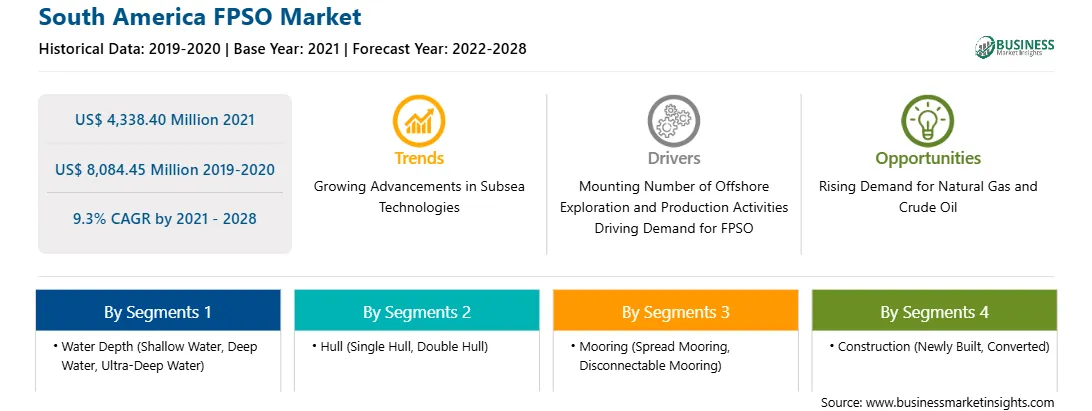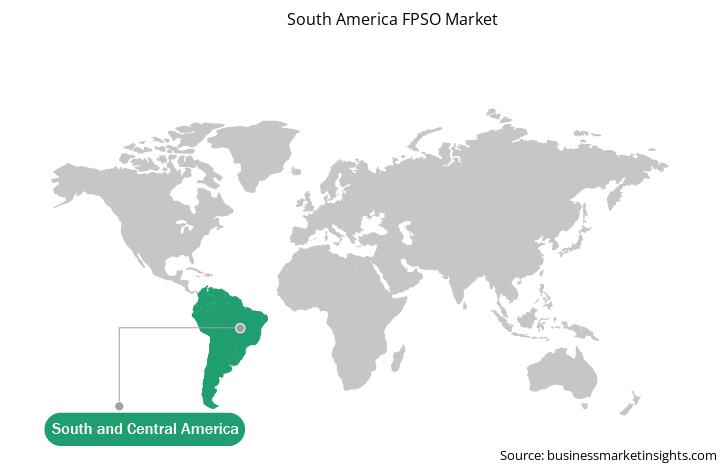Technological developments have directly impacted Brazil and Argentina's economy, advancing it to a large extent. The use of oil in SAM has steadily decreased over the last three years. However, with the recovery of the crude oil market, the situation is likely to change, and companies are now looking for more oil and gas exploration and production. According to OilNow, in 2022, Brazil, Mexico, and Venezuela will be producing most of the oil in South America. These three nations account for over 75% of the region's total output and are also global giants, ranking as the 10th, 11th, and 12th largest oil producers, respectively. South American oil output peaked at over 7 million barrels per day a decade ago, with the current production surging to 7.5 million barrels per day. Rising oil output propels the demand for FPSO and other equipment, which bolsters the growth of the FPSO market in the region.
According to the International Energy Agency (IEA), expenditure on upstream activities in SAM is expected to increase due to high investment by Brazil, Argentina, and Colombia. Petrobras, a Brazilian state-owned oil company, plans to invest US$ 75.7 billion over the next five years to boost oil production. In addition, oil & gas-related projects are increasing, which increases the use of FPSO. For example, in June 2019, Total, a refining company based in France and its partner, made an investment decision for the second phase of the Mero deep offshore project, 180 km off the coast of Rio de Janeiro, Brazil. Mero 2 floating production storage and discharge (FPSO) has a liquid treatment capacity of 180,000 barrels per day. For instance, in 2021, SBM Offshore, a Dutch corporation, was contracted by ExxonMobil to conduct Front End Engineering and Design (FEED) on its FPSO vessel for the fourth FPSO to be deployed in Guyana. For instance, in 2022, ExxonMobil started production at Guyana’s second offshore oil development on the Stabroek Block, Liza Phase 2, bringing total production capacity to over 340,000 barrels per day. Thus, all these factors are driving the growth of the FPSO market in SAM.
With new features and technologies, vendors can attract new customers and expand their footprints in emerging markets. This factor is likely to drive the South America FPSO market at a notable CAGR during the forecast period.
South America FPSO Market Segmentation
The South America FPSO market is segmented into water-depth, hull, mooring, construction, and country. Based on water depth, the market is segmented into shallow water, deep water, and ultra-deep water. The shallow water segment held the largest market share in 2021. Based on hull, the market is bifurcated into single hull and double hull. The single hill segment held a larger market share in 2021. Based on mooring, the market is divided into spread mooring and disconnectable mooring. The spread mooring segment held a larger market share in 2021. Based on construction, the market is bifurcated into newly built and converted. The newly built segment held a larger market share in 2021. Based on country, the South America FPSO market is segmented into Brazil, Argentina, and the Rest of South America. Further, Brazil held the largest market share in 2021.
BW Offshore; CNOOC Limited; Energies; Equinor ASA; Exxon Mobil Corporation; MODEC, Inc; Petrobras; SBM Offshore; and Shell Plc are among the leading companies operating in the South America FPSO market.
Strategic insights for the South America FPSO provides data-driven analysis of the industry landscape, including current trends, key players, and regional nuances. These insights offer actionable recommendations, enabling readers to differentiate themselves from competitors by identifying untapped segments or developing unique value propositions. Leveraging data analytics, these insights help industry players anticipate the market shifts, whether investors, manufacturers, or other stakeholders. A future-oriented perspective is essential, helping stakeholders anticipate market shifts and position themselves for long-term success in this dynamic region. Ultimately, effective strategic insights empower readers to make informed decisions that drive profitability and achieve their business objectives within the market.

| Report Attribute | Details |
|---|---|
| Market size in 2021 | US$ 4,338.40 Million |
| Market Size by 2028 | US$ 8,084.45 Million |
| Global CAGR (2021 - 2028) | 9.3% |
| Historical Data | 2019-2020 |
| Forecast period | 2022-2028 |
| Segments Covered |
By Water Depth
|
| Regions and Countries Covered | South and Central America
|
| Market leaders and key company profiles |
The geographic scope of the South America FPSO refers to the specific areas in which a business operates and competes. Understanding local distinctions, such as diverse consumer preferences (e.g., demand for specific plug types or battery backup durations), varying economic conditions, and regulatory environments, is crucial for tailoring strategies to specific markets. Businesses can expand their reach by identifying underserved areas or adapting their offerings to meet local demands. A clear market focus allows for more effective resource allocation, targeted marketing campaigns, and better positioning against local competitors, ultimately driving growth in those targeted areas.

The South America FPSO Market is valued at US$ 4,338.40 Million in 2021, it is projected to reach US$ 8,084.45 Million by 2028.
As per our report South America FPSO Market, the market size is valued at US$ 4,338.40 Million in 2021, projecting it to reach US$ 8,084.45 Million by 2028. This translates to a CAGR of approximately 9.3% during the forecast period.
The South America FPSO Market report typically cover these key segments-
The historic period, base year, and forecast period can vary slightly depending on the specific market research report. However, for the South America FPSO Market report:
The South America FPSO Market is populated by several key players, each contributing to its growth and innovation. Some of the major players include:
The South America FPSO Market report is valuable for diverse stakeholders, including:
Essentially, anyone involved in or considering involvement in the South America FPSO Market value chain can benefit from the information contained in a comprehensive market report.